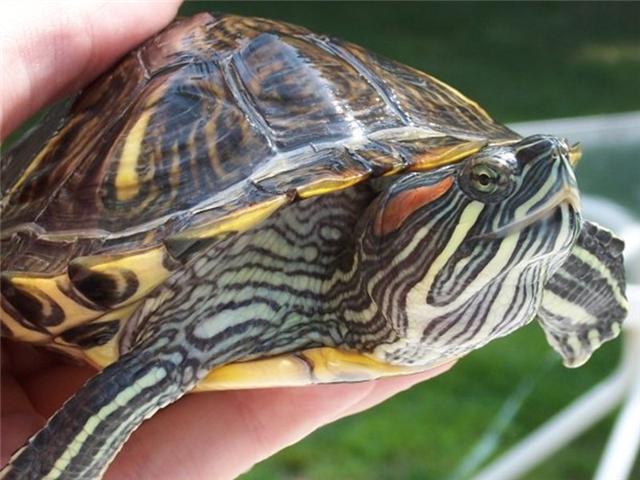 |
| Picture 1 Photo by Electronish (Jason) |
History
Red-eared Sliders are the most common aquatic turtles. They get their name from the broad red stripe directly behind their eye, and also because of their habit of sliding off logs and rocks when startled.
Appearance
You can easily recognize Red-eared Sliders because of their signature red stripes that starts at the tip of their eyes, and extends to cover the ear area. They are medium sized turtles with a somber green oval shell. In younger Red-eared Sliders, their dark green shells are marked with yellow (as shown in Picture 1). Not only are their shells green with yellow markings, but their legs are also the same in color.
Lifespan
Red-eared Sliders can live between 50-70 years.
Natural Environment
Red-eared Sliders normally range in areas from Illinois to the Gulf of Mexico, and the East Coast to western Texas. These turtles spend most of their time in or out of water. Although they can be found in lakes and rivers, they prefer ponds, marshes, slow-moving waters that supply energy (food) and basking spots. Red-eared Sliders will hibernate in the northern areas.
Diet
Adult Red-eared Sliders are omnivorous, whereas juveniles are mainly carnivorous. They feed on a variety of plants and animals in the wild. Some of these foods are: fish, crayfish, carrion, tadpoles, snails, crickets, wax worms, mealworms, aquatic incests, and numerous aquatic plant species.
Health Risks
Although Red-eared Sliders are cute and great pets, they do carry a harmful germ called Salmonella. Salmonella causes a serious infection on the gastrointestinal tract. Salmonellosis can be very serious and is sometimes fatal to young children, the elderly, and people with weak immune systems.
To reduce the risk of catching turtle-associated salmonellosis, below are some advice we advise you to take:
- Wash hands thoroughly with soap and water before and after contact with the turtle or their feces (poop).
- Separate the turtle from any possible contact with human food.
- Wash surfaces that the turtle has contacted.
- Do not have Red-eared Sliders in your home if you have children under 5 years of age, the elderly, or people with weak immune systems.

No comments:
Post a Comment